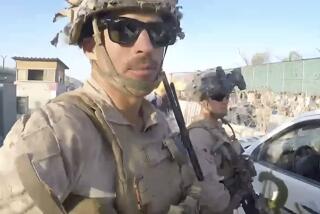Saudis Find No Foreign Role in Blast
- Share via
CAIRO — There was no foreign involvement in the June 1996 bombing that killed 19 U.S. military personnel at their Khobar Towers housing complex in Dhahran in eastern Saudi Arabia, the Saudi interior minister said Friday.
The statement, the first definitive Saudi finding in a nearly two year investigation, seemed to rule out earlier hints that Iran or the Iranian-backed Hezbollah movement in Lebanon’s Bekaa Valley had played a role in the worst anti-U.S. terrorist attack in the Persian Gulf.
On the evening of June 25, 1996, a truck pulled up to a fence separating the Khobar Towers housing complex from a public parking lot. The driver jumped into an accomplice’s car, which sped away. Suspecting an attack, U.S. military police posted on a roof raised an alarm. But only a few of the service personnel could be evacuated before a mammoth truck bomb blast detonated, shearing off the front of the apartment tower closest to the explosion and sending deadly shards of glass whistling through the entire camp.
The bombing “was executed by Saudi hands,” and “no foreign party had any role in it,” Saudi Interior Minister Prince Nayif ibn Abdulaziz said in an interview in Riyadh, the Saudi capital, with Kuwait’s Al-Rai Al-Aam newspaper.
The prince, a brother of King Fahd, has promised that full findings of the Saudi investigation will be announced soon.
It was uncertain whether U.S. officials will accept the Saudi finding. The United States has complained repeatedly about the level of cooperation in the investigation, particularly Saudi authorities’ refusal to let FBI agents interview suspects in Saudi prisons. FBI Director Louis J. Freeh has traveled to Saudi Arabia several times in unsuccessful efforts to win permission for his agents to talk to suspects.
The blast also injured 384 people, including 109 Americans.
U.S. forces remain in Saudi Arabia as part of Operation Southern Watch, which monitors a “no-fly” zone in southern Iraq that was established after the 1991 Persian Gulf War.
After the Khobar Towers bombing, U.S. officials transferred the 5,000 Air Force and other service personnel to a far more secure headquarters in the midst of a Saudi air base 100 miles south of Riyadh; “force protection” against terrorism was made a watchword for all U.S. commanders around the world.
The finding that only Saudis were involved raises the question of whether the attack was linked to a November 1995 bombing in Riyadh of a U.S. training facility for members of the Saudi national guard. Five U.S. military personnel died in that bombing, and four Saudis, who confessed and said they were motivated by radical Islamic beliefs, were beheaded before they could be interviewed by U.S. officials.
Saudi dissident groups abroad have predicted that the kingdom’s ruling family would try to pin the Khobar attack either on a foreign country or on Saudi Arabia’s Shiite minority, to avoid revealing the extent of the opposition that it faces from dissidents within the nation’s Sunni majority.
Early in the investigation, there were reports that a previously unknown Shiite opposition group, Saudi Hezbollah, had been implicated. Other suspicions focused on an Iranian link, especially when a Saudi Shiite dissident, Hani Abdel Rahim Hussein Sayegh, was apprehended in Canada last year and appeared ready to cooperate with U.S. authorities to avoid extradition to Saudi Arabia.
Canadian intelligence officials, based on information from the Saudis, had alleged that Sayegh was a member of an Iranian-backed terrorist group, that he carried out surveillance on the Khobar Towers complex, and that he had actually assisted in the bombers’ escape.
But when Sayegh reached the U.S., he abrogated a plea-bargain deal with prosecutors and refused to cooperate. The case later fell apart for lack of evidence, and Sayegh was handed off to immigration officials for deportation.
Saudi authorities demand his extradition, but he is still in custody in the United States, awaiting a ruling on whether he is to be deported to Saudi Arabia or to another country.
More to Read
Sign up for Essential California
The most important California stories and recommendations in your inbox every morning.
You may occasionally receive promotional content from the Los Angeles Times.













